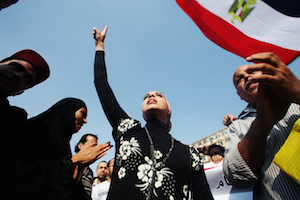By Rowan Popplewell.
Recent years have seen the publication of an increasing number of media and research reports describing how a significant number of governments across different world regions are systematically closing political space for civil society organisations. Publications, such as Closing Space: Democracy and Human Rights Support Under Fire, written by Thomas Carothers and Saskia Brechenmacher, and the CIVICUS State of Civil Society report, record how states use a combination of legal and extra-legal measures to prevent civil society from operating freely. From the use of restrictive legislation to curb the activities of outspoken NGOs to the use of disproportionate violence to disperse social protests, the picture these reports paint is a bleak one.

Women’s presence in Tahrir Square during a protest against the Military Trial for civilians.
Although real examples of this increasing pushback are all too common, the story is not as straightforward as some of these papers make out. A recent report, written by researchers at INTRAC, the European Association of Development and Training Institutes (EADI), and the University of Portsmouth, highlights the contradictions, complexities and nuances characterising the issue of civil society space today[1]. It does this through exploring legal frameworks and political space for non-governmental organisations in six countries: Egypt, Kosovo, Myanmar, Peru, Rwanda, and Vietnam.
The report concurs with others that overall, operating contexts are becoming more challenging, especially for organisations and individuals working on more sensitive issues such as human rights. In many of the case studies featured in the paper, poor legal frameworks are having profound impacts on civil society. The absence of a clear legal framework continues to create an insecure and unpredictable environment for civil society in Vietnam and Egypt. In Peru and Myanmar, restrictive legislation is limiting the operational efficiency of NGOs and preventing them from engaging in advocacy, lobbying and campaigning.
However, the research finds that globally, a strong rhetoric about enabling space for civil society is emerging, embedded in the Busan Partnership for Effective Development and initiatives such as the CIVICUS Enabling Environment Index. In some countries such as Kosovo, this discourse is trickling down to the national level, resulting in positive improvements in legislation. Yet the report also warns against complacency. Although good legal structures are crucial to creating an enabling operating environment, legislation is not always implemented. Even strong frameworks can be and are abused.
Perhaps most importantly, the research finds that even in the most complex and restrictive environments, important spaces for engagement exist, which many of the global level analyses do not pick up. Often NGOs have to work on government terms, and pick their battles carefully, but this does not prevent them from operating.
Although it is concerning when NGOs reduce their engagement to service delivery functions, which are often ‘safe’ topics, the research shows that in some contexts, this provides an invaluable avenue for dialogue and trust-building, which can be positive for civil society and those they work on behalf of in the long term. This seems particularly to be the case at the sub-national level. In Rwanda, space for civil society engagement with government is carefully controlled, but decentralisation policies aimed at strengthening local decision making have opened up space for citizen engagement with the state at a local level.
Clearly the picture regarding civil society space is far more complex than is often made out. Spaces for civil society voice and action exist even in the most challenging and difficult of circumstances. However, finding them is not easy. It requires in-depth understanding of the historical and contemporary context within which civil society operates and it requires good, independent and up-to-date knowledge on civil society itself, so that NGOs, donors and policy makers can provide informed, relevant and constructive support that enables different forms of local civil society to be proactive within this environment.
[1] This research was commissioned by the German Ministry for Economic Cooperation and Development (BMZ). The report was written by Rachel Hayman (INTRAC), Angela Crack (University of Portsmouth), Joan Okitoi (EADI), and Sarah Lewis (INTRAC), with Brian Pratt (INTRAC), Suzanne Bakri (INTRAC) and Rowan Popplewell (INTRAC). This research builds on an earlier study, published by EADI in July 2013, which looked at legal frameworks and political space for NGOs in Bangladesh, Ethiopia, Kyrgyzstan, Honduras, Serbia and Uganda.
Image credit: Protesters in Tahrir Square, Egypt, in 2011. By Oxfam Novib. Used under creative commons licensing.